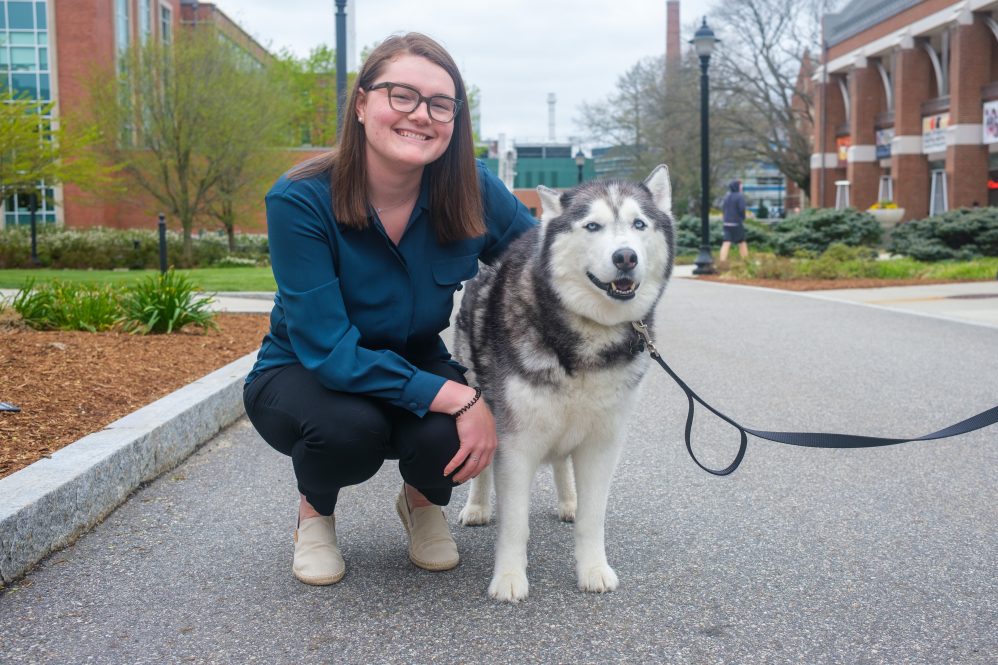Zoey England ’22 (CLAS) has been named a winner of a Gilman-McCain Scholarship, the first in University history.
The scholarship program, sponsored by the U.S. State Department, provides awards of $5,000 for undergraduate child dependents of active duty service members to study or serve an internship abroad. It was developed under the framework of the State Department’s Benjamin A. Gilman International Scholarship Program and named after the late Senator John McCain of Arizona.
UConn students apply for the scholarship with the support of the Office of National Scholarships and Fellowships and Experiential Global Learning (EGL). The scholarship requires students to participate in a program approved by their institution and the application process includes the proposal of a service project to take place at their campus or community.
England will work with EGL to reach out to military veterans at UConn to discuss the value of study abroad, opportunities for funding, as well as the diverse array of programs available to students.
England, who is just one of 100 students to earn the scholarship this year, has an individualized major at UConn in population health, disease and policy, and will finish her undergraduate degree this summer. She is also working on a master’s degree in public health.
This fall, England will begin full-time employment at UConn’s Werth Institute for Entrepreneurship and Innovation and will be based at UConn Stamford.
Before coming to UConn, England grew up in a Navy family and lived in eight states, including six before she turned 15.
She also had the unique distinction of actually earning a college associate’s degree from Tidewater Community College weeks before she graduated from high school in Chesapeake, Virginia. England was a cello player in her high school orchestra, which performed at New York’s Carnegie Hall. She continues to play the instrument.
England will use the funds from the Gilman-McCain award to perform research this summer as part EGL’s summer interdisciplinary ethnography field school in Mauritius – a small island country off the east of Africa with a population of just over one million.
The course is led by UConn anthropology professor Dimitris Xgalatas, who has been conducting research in Mauritius for over a decade. The UConn program was planned to be offered for the first time in summer 2020, but was cancelled as a result of the COVID-19 pandemic. England will be part of the inaugural group of UConn students to perform research in this new location that offers greater diversity to the EGL portfolio.
“It is a country that has kept very isolated and has maintained a lot of their indigenous cultural traditions,” says England. “We are partnering with a couple of different community organizations there and conducting our own ethnographic research, which is very qualitative research.”
The program structure provides students with a unique opportunity for learning through interactions with Mauritian citizens from all walks of life.
England was scheduled to participate in EGL’s winter in Costa Rica program in 2022, but that was also cancelled due to the COVID-19 pandemic.
“Zoey is a great example of a student who really persevered to have the type of global experience she set out to create for her undergraduate career,” says Valerie Jenkelunas, UConn’s Gilman certifying advisor and EGL coordinator. “We always talk to students about the importance of backup planning during advising, as well as being adaptable when preparing to participate in an EGL program. This became even more critical during the pandemic, which made it essential to have alternate plans to make studying abroad possible. The ability to adapt to new circumstances, including reframing goals for participating, became relevant before students even set foot in their host country.”
England also has a journalism background, and wrote a number of stories for UConn’s student newspaper, The Daily Campus. She founded a program called “Innovation Conversations” – a collaboration between The Werth Institute and the UConn Foundation that provides opportunities for UConn students to share ideas, stories, and experiences with senior-level executives and industry leaders.
She also developed PhyMap, which provides technologically independent epidemiological disease mapping for resource-scarce communities using the innate capabilities of a biological avatar.
“At UConn, I really developed a passion for entrepreneurship and journalism, as a means for storytelling and being a change agent,” says England. “A lot of my stories are public health-centered, but climate change and climate change activism is a huge passion of mine as well.
“That is another draw to my work in Mauritius – as an island country. I wanted to see how the population is impacted by climate change and how as a culture in the United States, we sometimes look at climate change as an abstract concept. Growing up in a Navy family, I always lived near the water, so I saw the effects of climate change first-hand with events like hurricanes. I am excited to do the research out of the United States.”



